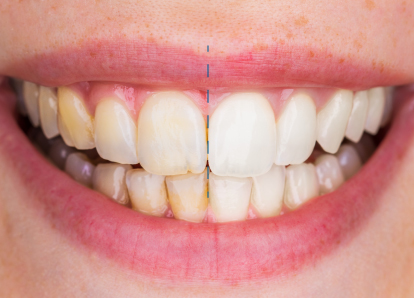TEETH WHITENING
We all like the appearance of healthy white teeth. The popularity of cosmetic teeth-whitening is on the increase and a greater number of patients are asking about how to make their teeth look whiter.
We would always recommend that you use trusted and reputable sources of information to help you make your mind up when considering any treatment (cosmetic or otherwise). Ideally you should speak to a healthcare professional who can give advice tailored to you as an individual.
For the protection of the public and patients the General Medical and Dental Councils now have very strict guidelines on cosmetic treatments. It is now against the law to supply materials or conduct teeth-whitening unless you are a registered healthcare professional.
The National Health Service has issued advice on teeth-whitening and this can be found on the following link www.nhs.uk/live-well/healthy-body/teeth-whitening/
Why are my teeth discoloured?
Generally, the discolouration of teeth is mostly attributable to external staining. This staining comes from food, drink and other habits like smoking. Calculus (the mineralised plaque deposits on teeth) is a major factor.
With time and if untreated, this staining can become more established and begins to affect the layers beneath the surface.
Wear, tear and fracture lines can also change the surface properties of the enamel and allow the staining to be carried deeper into the tooth tissue, all leading to the effect of discolouration.
Sometimes genetic influences and medical issues during development can contribute to an apparently darker appearance of the teeth.
How can I whiten my teeth?
In most individuals, merely having the teeth cleaned by a hygienist can radically improve the appearance of the teeth to the point where patients no longer feel the need to consider any other option. If you are going to consider home-whitening or ‘laser’ treatments, then we would recommended you have your teeth cleaned by a hygienist first. If you do not, then any staining or deposits on the surface will prevent the whitening gels from reaching the enamel and taking their effect.
Normal teeth-whitening involves bleaching the teeth using a specially formulated gel. The teeth will not be bright white, but it usually improves the shade. Remember that this method will not change the colour of existing crowns, bridges or tooth-coloured fillings. You may need to have these restorations changed in order to match the ‘new’ shade of the whitened teeth.
The results will vary between individuals and so it is not always easy to give a patient an indication of how effective the treatment will be.
Who can perform teeth-whitening?
By law only registered healthcare professionals can conduct tooth-whitening procedures.
You can read the General Dental Council’s position statement on the subject using the following link www.gdc-uk.org/api/files/Tooth-Whitening-Position-Statement.pdf
What are the potential risks of whitening?
The most notable risks are the increase of sensitivity to cold and hot. In most people, this effects are transient, although in some cases they can remain for many months or even years.
Less commonly, the whitening chemicals can also damage the enamel of the teeth or cause irritation and inflammation of the gums. For this reason, the treatment should be conducted under the supervision of your healthcare professional and you should very carefully follow the instructions.
Does tooth-whitening last for life?
It does not. Depending on the individual and their diet the effect can last from months to years. If you make sure that you keep you whitening trays clean, cool, safe and dry then you can repeat the process again in the future if necessary. Your healthcare professional will give you advice on what to do and supply you with fresh gel.

